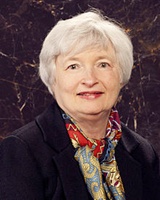Fed decides to keep rates unchanged for the near term
18 Dec 2014
The US Federal Reserve has advised patience in beginning to normalise its monetary policy stance despite signals of a change in the policy outlook, based on available economic indicators.
 Fed chief Janet L Yellen said the Federal Open Markets Committees (FOMC), the policy making body of the central bank, ''is unlikely to begin the normalisation process for at least the next couple of meetings.''
Fed chief Janet L Yellen said the Federal Open Markets Committees (FOMC), the policy making body of the central bank, ''is unlikely to begin the normalisation process for at least the next couple of meetings.''
The committee decided to continue with the current 0 to 0.25 per cent interest rate target range for federal funds, which it said was appropriate for keeping employment and economic growth on course.
FOMC said it would assess the progress - both realised and expected - toward its objectives of maximum employment and 2 per cent inflation in deciding how long to maintain this target range.
However, the committee said, if the progress toward employment and inflation objectives gets faster, then increases in the federal funds rate are likely to occur sooner than currently anticipated. Conversely, if progress proves slower than expected, then increases in the target range are likely to occur later than currently anticipated.
The committee decided to continue reinvesting principal payments from its holdings of agency debt and agency mortgage-backed securities in agency mortgage-backed securities and of rolling over maturing treasury securities at auction. Sizeable holdings of longer-term securities should help maintain accommodative financial conditions, the committee noted.
Seven of the 10 FOMC members, including the chair Janet L Yellen, voted for the monetary policy action while three others voted against the policy decision.
Voting against the action, Richard W Fisher, CEO of the Federal Reserve Bank of Dallas, said while the committee should be patient in beginning to normalise monetary policy, improvement in the US economic performance since October has been faster than the majority of the committee envisions to warrant satus quo.
Narayana Kocherlakota, president of the Federal Reserve Bank of Minneapolis, said the committee's decision to postpone a policy change in the context of ongoing low inflation and falling market-based measures of longer-term inflation expectations created undue downside risk to the credibility of the 2 per cent inflation target.
According to Charles I Plosser, president of the Federal Reserve Bank of Philadelphia, FOMC should not stress the importance of the passage of time as a key element of its forward guidance and, given the improvement in economic conditions, the current guidance was inconsistent with previous statements.
Fed chairman Janet Yellen had earlier stated that monetary policy would return to normal as and when economic activity, employment and inflation also turn normal.
''As employment, economic activity, and inflation rates return to normal, monetary policy will eventually need to normalise too, although the speed and timing of this normalization will likely differ across countries based on differences in the pace of recovery in domestic conditions. This normalisation could lead to some heightened financial volatility,'' Yellen had stated last month.
While the US Federal Reserve had already stopped its bond buying programme, the latest policy stance that it "can be patient" over any decision to raise interest rates sent US markets higher with the Dow Jones rising nearly 300 points.
Investors have been anxious about when the US central bank will raise its short term interest rate, which has remained at 0 per cent since late 2008, when the Fed slashed rates in the wake of the financial crisis.
Indian markets also rallied, with the rupee rebounding from a 13-month low hit in the previous session.
Indian shares and bonds also benefited as Russia's rouble stabilised after dramatic falls this week, reducing some of the fears of financial contagion to emerging markets.


















